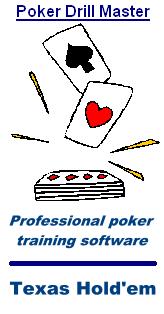Live Poker Tournaments
Calculator Software Reviews
Poker Room Reviews
|
TEXAS HOLDEM TACTICS When playing low limit online poker your most important weapons will be discipline and patience. If you exercise both patience and discipline I guarantee that you will beat the low limit online games! But when you play poker your main objective should always be to win money and improve your play, no matter what the limit. If this is always your primary goal you should be able to improve and move up to the higher limits. I have a great time while I play, but I never forget why I play, to hone my skills and most importantly to win money! You will not be relying on luck to win, even at the low limits, although most of your foes will be. At low limit online holdem, there will be two key factors that will make you a winner. The first is that you will use patience and as such you will usually enter a pot only with a premium hand. The second factor is that you will not get married to your hands, that is, you will have the discipline to get away from even a premium hand when it becomes apparent that it is a loser. If you can do these two things you will beat any low limit online game (you will beat any brick and mortar game too). Since you will be exercising extreme patience and discipline, the results will be, you will consistently start with better hands than your opponents. As such the hands you don't win will be because your opponents got lucky against you. You will almost always be leading before the flop in most hands you play. Right now I'm going to give you a tip that hopefully will save you much anguish. At first, it may seem like your foes always get lucky against you, and you never catch lucky to beat them. While this is not fair, it will for the most part be true. Let me explain why. It took me about a year to realize this rather obvious (and unfair) truth. I am going to save you the agony of thinking that the poker gods are against you, and how poker just isn't fair. It is really quite simple. Often, you will be ahead and the favorite in any pot you enter. Your foes will have the worst of it and need to catch a lucky (or sometime miracle) card to beat you. The first thing you should know is that holdem poker is a highly positional game. I want to stress that since this is aimed at a beginner/intermediate player I am not going to spend too much time discussing position. Position will be discussed but at a rudimentary level. The higher the limit the more important position is. In No Limit position is of paramount importance. If everyone checks to you, and you have a mediocre hand you can bet it. If you have nothing you can check and give yourself a free card. If you have a hand that you want to try and limit the field on you can raise, or re-raise in the hopes of driving out other players (the blinds in particular). If you have an average hand like pocket nines and the pot has been raised, and re-raised you can muck your hand without it costing you a thing. There are tremendous advantages to always being able to act last, and as such you will be able to play some hands on the button that you cannot play from early position.
(Pocket Aces On the Flop) This is the second best hand you can start with. You will play them pretty much the same way you play aces, jam the pot as hard as you can before the flop for the same reasons I have listed above. (Pocket Kings Post Flop) In my opinion this is the 3rd best starting hand you can have. If someone wants to tell me they like AK better I wouldn't put up too much of a fuss. These two hands run pretty close. In low limit holdem AK might even do better at a full table, but we will talk about that hand next. Right now you have QQ, so how do you play them? Well very much like your pocket aces and your pocket kings, especially at the low limit games. You bring them in for a raise from any position for two reasons. Firstly, to get as much money in the pot with what is likely the best hand before the flop, and secondly to limit the field. At the low limit games I want you to re-raise with your QQ from any position (a tactic I would not endorse at the higher limit games). (Pocket Queens Post Flop) So you are lucky enough to limit the field to one or two players and you get a flop with no over cards. Go ahead and bet, if you are bet into raise, if you get re-raised, its time to slow down. Take a good look at the board. Think about the kind of cards your opponents might be playing. Have they been showing down reasonable hands? Have they been raising with nothing, or only when they have a premium hand? Is there a J or a 10 on the flop? If so do you think they might have a hand like AJ or A10? Did they 4 bet you before the flop? If so they may have a bigger pair than yours. Does the flop have suited connectors, or is it completely ragged? You must always be asking yourself these types of questions as you play if you hope to be a winner, no matter what the limit. This is another one of the premium holdem hands. You will want to raise this hand from any position other than the blinds. If you are a very aggressive player go ahead and raise it from the blinds as well. Don't re-raise this hand from the blinds as AK is a positional hand and you will be first to act for the entire hand, its just not worth a re-raise from the blinds. If you are in late position you can put in a re-raise, as you will have position on your foes. If you flop either an Ace or a King, you will have top pair, top kicker. This is the flop you are hoping for, so bet it strong. In this situation if you are first to act bet the flop, if someone else bets, raise or re-raise them. Much like the big pairs, this hand plays better against a limited field, especially if you hit the flop. If there is a lot of action again slow down and try and think about what your opponents have. Unless the board is scary, or one of your opponents has shown considerable strength with his bets, continue to lead at the pot. If the flop is ragged say 3s 6h Jd you will need to evaluate the situation. If you are in early position against more than one caller you should just check the flop. You only have over cards and there is a good chance you will get raised if you bet. If there is a single bet, you will call and hope to hit an A or K on the turn. Ace Queen plays very similar to AK you will want to raise this hand whenever you enter the pot regardless of your position. If you are in one of the blinds you should just call. I would not recommend re-raising with the hand very often. You may re-raise with it only when you have a good read on the raiser and you have observed that he is a very aggressive player (or a maniac) who raises with several holdings and you have good position, the button or next to it. Otherwise you should just call and have a look at the flop. A Q (Post-Flop) If you hit either your ace you will have top pair second best kicker, if you hit you queen, and there is no over cards you will have top pair top kicker. As such a flop like Qc 7s 2h is a very good flop for you and you should play it fast. If you are first to act bet, if someone else has bet, raise. Continue to play the hand fast unless your opponents continue to play back at indicating a lot of strength. If this happens slow down and just call the hand down, they could have flopped a set, or perhaps have an over pair (you should have an idea about this as they likely would have been a lot of pre-flop action). If you flop an ace again play the hand fast. If there was pre-flop raising you must be careful if your opponents are showing a lot of strength on the flop, you might be up against AK, so pay attention and be careful if your opponents continue to play back at you. Note that a flop of Kd 9h 2s is a terrible flop for you. Any flop with a Kxx in it is a bad flop for you hand and you should simply muck your hand if anyone bets the flop. You should play the hand the same way you play AK if you miss the flop and no king is on the board. Hand 6 & 7 other Big Connectors AJ, KQ (Pre-Flop) I am lumping these two hands together because you can play them pretty much the same. If the game you are playing in isn't very aggressive (there isn't to much raising before the flop) the hand can be played from all positions. If you are entering the pot from an early position with one of these hands you might just want to limp in. There could be a great deal of action behind you, and if the pot is capped by the time it gets back to you, you can get away from the hand by mucking your cards. They just are not worth four bets before the flop; if the hand is raised behind you, call. It the pot is raised and re-raised you can call if the pot is multi way, 4 players or more but you will need to hit the flop perfectly in order to continue playing the hand, so proceed with caution. AJ, KQ (Post-Flop) The flop is going to have to help your hand in order for you to continue playing a hand like this. If you hold KQ and an ace hits the flop you are done playing the hand (unless you flop two pair or better). If you hold AJ and an ace hits the flop, you will lead at the pot, but you must proceed with caution. If there was any pre-flop action, and there is a lot of action on the flop you are probably better off to simply get away from your AJ. This is where knowing your opponents will help you. If you do decide to continue with the hand again, do so with caution. Yeah you have a pair of aces but you only have one pair and your kicker isn't great so don't bet this hand to the moon like many of your opponents do. There is no need to loose additional bets due to bravado. If you get a favorable flop to a hand like this you will want to continue leading at the pot unless one of your opponents shows a great deal of strength, then just check and call the hand down. Hand 8&9 other Big Connectors KJ, JQ (Pre-Flop) These two hands are definitely part of the big card family, but they are not raising hands. They should be discarded from very early position. They can be played from mid position or better. If the pot is raised you can protect your blinds with a hand like this as you are already part way into the pot and likely will be getting correct pot odds to continue. You want to try and get into the pot as cheaply as possible with a hand like this because if the flop doesn't improve your hand you will be mucking your hand for any bet on the flop. KJ, JQ (Post-Flop) You will need to improve your hand on the flop or you will not continue playing the hand. You will either need to flop a pair or an open ended straight draw or you will have to muck your hand. If you flop a pair and there is no over cards on the flop you will have top pair with a decent kicker. You will want to bet or raise with a hand like this. If you get played back at, at all (raised or re-raised), you must slow down, evaluate the hand and decide if the hand is worth continuing with. Often you will need to muck it right then and there. If you decide to continue with the hand, check and call as long as no over cards or scare cards hit the turn or river, if they do you likely will have to muck your hand. You must play hands like these very carefully or they will end up costing you a lot of money. Medium to Small Pairs, Pocket Jacks Through Pocket Twos (Pre-Flop) While a pocket pair of Jacks is vastly superior to a pocket pair of twos you will actually play all of these pockets quite similarly. The higher the pair the more strength it has. You will absolutely need to hit any hand between 22-88 to have at chance at winning the pot. Occasionally you can win with jacks, tens, and nines without hitting them, but you will need a very favorable flop for these hands to hold up (no over cards, no suited connectors etc.). In early position these hands should be thrown in the muck. With the exception of jacks and tens, with either of these two pockets limp in from early position, they are just a little too good to muck, even from up front. These hands will be very, easy to play after the flop. You will only be able to continue playing if one of two things happens. Firstly, if you hold one of the higher holdings, like tens, or jacks, about 40%-50% of the time an over card will not hit the flop. If this happens play your hand very strong on the flop, bet or raise the hand in hopes of driving out player who hold over cards. If an over card hits on the turn or the river and there is any action you will have a tough decision, either check and call, or muck your hand if you figure you are beat. If there is a bet and a raise when an over card hits, trust me, you are beat, muck your hand. Suited connectors and Ax Suited hands Pre-Flop There are certain times that you may play these types of hands. They require the same criteria as small pairs. Again, they play well against many opponents, and you would like to enter the pot for one bet from late position. You can call a raise only if you are in very late position and there are at least three other players already in the pot. If you can't enter the pot under these circumstances than you must pass on the hand. It is these types of hands that cost beginners and intermediate players tons of money. They continually enter pots out of position, under a raise when they shouldn't, in non-multi way pots, these are all horrible plays and you will NEVER again make them yourself. Suited connectors and Ax Suited hands (Post-Flop) Again, they play very similar to your little pairs. You need to flop to these hands perfectly. You need either an open ended straight draw, or a flush draw or better to continue playing one of these hands. If you have a big draw like either of the ones I just mentioned you usually should just check and call. In limit holdem, if you have at least two other players in the pot, you will always be correct in calling the hand all the way to the river. You will be getting sufficient odds to continue with your drawing hand. CONCLUSION I believe that making notes is so important to your online win rate that I have included a few here as an example of how you might do it. Please note that many of my notes will be referring to 100 and 200 No limit sit and go tournaments but I believe you will get the idea. Example 1 Player A 100 NL called my raise at level 5 in SB with K8, flop came 225, he bet 500, He goes all-in with any ace at end of tourney, clueless at end of a tourney, Example 2. Player B 100 NL called an allin level 2 with AQ pre-flop, only bets the goods Example 3 Player C 50 limit, 4 bet me on flop with nothing, made foolish bluff Example 4 Player D 50 NL chasing fool, chased 2nd pair to river board came a7878, HE WILL PAY ME OFF, PLAY FAST AGAINST HIM Example 5 Player E100 NL, over better, chase top pair no kicker at any cost, easy to trap, easy to check raise Example 6 Player F Strong player, plays well, try to avoid
|



